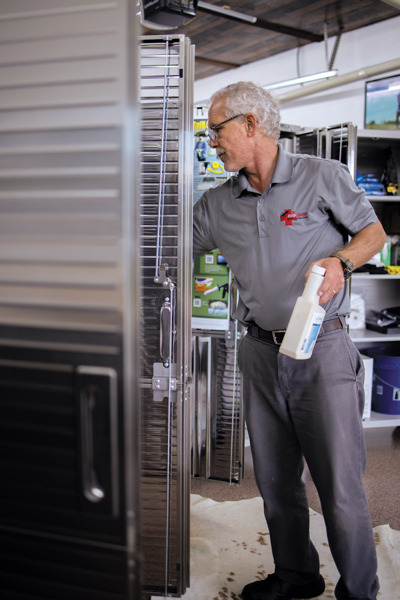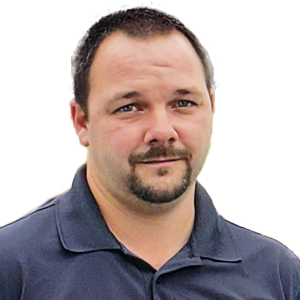MARKETING MANAGEMENT

The Bug Doctor’s Jerry Schappert, ACE. PHOTO: ANTHONY GALARZA/GTA MEDIA & DESIGNS LLC
While Sievers plans to add a little more to Profshient’s marketing budget, the majority of his added revenue is going toward bonuses, salary hikes, and next-level medical and retirement plans. He sees contented employees as the best marketing for his business.
“When folks are happy where they work, the clients see and feel it,” he adds. “This leads to more calls and more work.”
Veal agrees, and reiterates he learned what to do and what not to do early in his career.
“Anytime I make a decision, I like to zig when I know a previous boss would have zagged,” he quips. “For example, most pest control trucks in my market are white or green. That’s why I went with black.”
Veal uses his marketing budget to promote his company brand and YouTube channel. This has the added benefit of reinforcing the information he may have told a customer at a service call.
“For a cockroach account, I might only see the husband during the initial visit,” he offers as an example. “Then his wife comes home and asks ‘What did he tell you?’ Well, there’s a YouTube video he can show her about cockroaches where I basically explain everything I plan to do. It’s good information for potential customers, and for new and existing customers, too.”
Using the videos in this manner gives Veal’s channel more clicks, which raises its profile in the YouTube algorithms, making it more likely to be found in searches for keywords like “pest control.” To Veal, it’s a win-win.
Deanna Kjorlien, ACE, president of Green Dog Pest Service in Gig Harbor, Wash., admits that the COVID-19 pandemic affected her marketing plans “quite a bit.”
“We used to sponsor many state and regional educational events,” she explains, noting that more than 90 percent of her business is subcontracting K9 inspections to PMPs. “Meeting with professional pest management teams face-to-face at industry events was really our go-to marketing. We have continued to sponsor some online seminars and events, and I still give classes for continuing education units [CEUs] online, but the budget has changed.”
For 2021, she says, “our marketing budget will be modest until we figure out what is happening with the pandemic and how it will affect our clients.”
Third-generation PMP Kevin Sherrill, president of Sherrill Pest Control, notes the pandemic shifted his Manchester, Tenn.-based company’s focus from working festival events to becoming primarily residential-focused. “Our marketing always has been more community-based, but we do spend some money on web search engine optimization [SEO],” he explains. “We’ve grown organically, but we knew we needed a process in place to increase our leads. We decided this pandemic was forcing us to take a closer look at our marketing and resolve that we were going to come out of this thing a stronger, better company.”
REMOTE WORKING

Jason Heiser
Sherrill Pest’s senior service team lead, Jason Heiser, said the pandemic showed the team they have more flexibility in growth than they realized. Employees can work remotely without a technical hiccup, for example, thanks to the software investment Sherrill Pest made two years before. This led to the idea of bringing on a couple of “flex techs” to supplement the universal technicians already in place at the company.
“Flex techs can handle new leads more quickly,” Heiser explains. “We can route them differently throughout the season. Maybe they’ll only do mosquitoes for a week, for example. Then the next week, they can cover someone’s vacation. We need them to be well-rounded individuals who are prepared to be very responsible and very busy.”
Sherrill notes that being in a remote area, he had always assumed that to open another office, he’d have to gain customers along the way from the existing office to the new office.
“But technology systems to allow us to think about things differently,” he says. “We don’t need to worry about having X number of accounts down a rural corridor. We can have a technician covering a target area instead. But our top goal is to always refine the way we make a positive customer experience.”
Alan Feuer, ACE, says Preventive Pest Control also used some of the downtime early on in the pandemic to “double down” on ensuring all the vehicles and equipment are in good running order, “and that all of the personnel are well trained in the care and use of such.” The Albuquerque, N.M.-based firm also added four-way driver cameras and GPS systems to improve driver safety, habit awareness and coaching. In addition, a new phone system installed in late 2019 allowed his team to work remotely as needed while seamlessly providing service.
“Because of this, we are able to bundle more services and utilize route density for even our specialty and advanced efforts, whereas before we would have sent a specialist to support our basic and intermediate techs,” explains Feuer, Preventive’s technical director. “If all goes well, these techs will have advanced to the point that they can handle many of these special services themselves.”
Scott Robbins, ACE, technical services manager for Action Pest Control, Evansville, Ind., says his technicians essentially are spending just one day a week at each branch. “When managers are due to give a ridealongs, they usually are following the techs in their own vehicles and then meeting in the field,” he explains. But this actually has had the added benefit of managers to check out their vehicles on the road, inspecting it while still performing a quality control check of the visit itself.
The Bug Doctor’s Schappert recommends that when PMPs configure their budgets, they keep in mind that “big purchases and investments in services need big thinking. The biggest challenge I see owners have is not knowing their numbers. Once you know them, you know what and when to buy.
“Look at the stock on your shelves, and instead of seeing jugs, tubes and bottles, picture it as paper money,” he concludes. “You’d be amazed at how it will open up your eyes on how you approach inventory.”
Leave A Comment